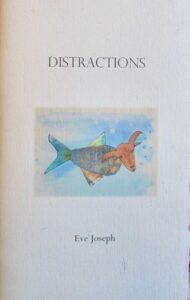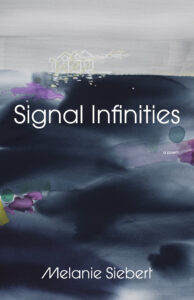Reconnections and transfigurations
Distractions
by Eve Joseph
London: Baseline Press, 2023
$15.00 / 9781928066873
Signal Infinities
by Melanie Siebert
Toronto: McClelland and Stewart, 2024
$22.95 / 9780771013980
Reviewed by Catherine Owen
*

Little perfect chapbooks where so much sensual intent is absorbed by the paper, font, cover art and even the dimensions of the text, are truly a pleasure to hold. Over the past decade or so, more chapbook publishers have popped up, such as David Zieroth’s Alfred Gustav Press, Jackpine, Anstruther, Frog Hollow and the one that published Victoria resident Eve Joseph’s Distractions, Baseline Press. They specialize in hand-sewn chapbooks, which makes them even more tangible and human, an effort this increasingly robotized world indubitably requires.

The twelve pieces in Distractions are all prose poems (leaping off from Joseph’s 2019 book Quarrels), almost-equivalent doors of words on the page, most wrangling with natural imagery and its exquisite moments of transfiguration.
Each commences with a declarative sentence or question, placing the speaker in a particular mood, such as with, “Everything was running too smoothly,” or perspective, (“Death and poetry need space for improvisation”) or positioning, (“Where is the turn in a poem?”) Then the elaboration, which often moves in ghazal-like leaps, paratactic and twisting, at times returning by the close to a response, often in ars poetica mode—even in an unattributed nod to Robert Frost in the line, “Like the / poem it must ride on its own melting.”
The lovely aspect of a chapbook is that one can readily re-read pieces and allow them more space and growth in the body and mind, especially with the prose poem form that, as a longer book, can feel lumpy, a trudge.
Occasionally, the images try too hard as with the spiders found in a beehive hairdo that are carried out, “like saints on litters” or the seamstresses who measure “the same old lies of eternity,” but for the most part, this delicate egg-carton of prose poems is a delightful slice of Eve Joseph’s impeccable way of seeing the grieving, dreaming world.
*

I loved Melanie Siebert’s Deep Water Vee (2010), a lucid, moving exploration of rivers amid colonialism and environmental depredations. Signal Infinities, her long-anticipated second collection, a lengthy poem in five parts (seeming more like a theatrical chorus than a singular piece), is in conversation with this earlier book. However, her new work is attendant on a lake (and other water sources such as “a great inland sea” or “a raindrop’s interior” from the opening poem, “Water Takes Up the Office”) and a much more complex engagement, enacted through a therapeutic relationship and its often-entangled-in-order-to-clarify discourses.
The water serves as both symbol and tangible evidence of a need for bond, rupture, balance. In one section, The Sessions on Replay, titles are drawn from the DSM-5 Pediatric Diagnostic Interview and the process of a therapist’s meeting with a client in gestures, movements, strainings toward.
Each segment begins with parenthetical phrases below the main title, signifying what? There is nothing directly implied here. The pauses, fractures feel Woolfian, both explicating an outer or inner context, creating a multiplicitous sense of reality, and inscribing their own deeper truths. Victoria-based Siebert’s sonorities are what my ear yearns for and I hear it in “hot spats of rationality,” an “epigenetic inheritance,” “as “tears when falling iridesce,” a “solitary hidden chick,” the “cold parade,” “a single sequin of anger,” and you “feinted hard and fire-blacked the memory.”

Although the language can be abstract at times, the aurality brings these terms back to the somatic. Also randomly appearing are lake-based italics like “Lake adheres to the sacred prohibition / against making an accurate image” and, in paler font, repetitions such as “Do not harm” or “Do something,” lines about ice, an animal-entity that “lifts a paw,” or internal stirrings of acknowledgment that “with stains I’ve blotted furiously.” It’s a visual plethora of text, including an instance of erasure and a mantra of the names of people “who have publicly told their stories of living through trauma and oppression.”
This verbose procedure can be overwhelming but it’s also accurate; and therefore, the reader may often be compelled to re-read the text in order to surge towards absorption.
The fourth section, Confessions to a Lake, addresses the confluence of colonial horrors, personal emergence, and the land’s replies most potently. The parentheses beneath are like strata, palimpsests, layering in their chilly denunciations: “(the actual lakes fed by ice for only a few wars longer)” / ”so many signals off the charts”).” The speaker declaims, “But we learned to renounce our bodies” and then fashions an aftermath. In a segment of triplet stanzas, she parses accountability: “Hail made us real as the trampled crops. / Slugs did not say their sorries to the greens. / Our freezers shuddered in their duty to meat.”
When Siebert is at her most powerful, her pieces evoke a melange of Denise Levertov’s eye and Sylvia Legris’s lexicon, her cadence a flux of molecular comprehensions. “Lake holds space” in a way humans struggle to, always learning, “the same things over and over,” and often “Obliged, it seems to repeat / trauma as current experience.” Most crucially, Siebert underscores that she wants her “oath of employment / to acknowledge the exposed lake beds.” There has been an excess of detachment, anomie and thus, damage. Everything needs re-connecting to flourish. And is non-negotiable.
Signal Infinities presents no simple guidance, no readily-digested messages. As it must, to be honest, it instead offers the intricate loopings of words, designated as yearnings towards trust. And is thus, “Tremendously electric.”
*

Catherine Owen was born and raised in Vancouver by an ex-nun and a truck driver. The oldest of five children, she began writing at three and published at eleven—a short story in a Catholic school’s writing contest chapbook. Since then, she’s released fifteen collections of poetry and prose, including essays, memoirs, short fiction, and children’s books; her latest are Moving to Delilah (Freehand Books 2024) and The Weather Says (Carbonation Press 2024). She also runs Marrow Reviews, the podcast Ms Lyric’s Poetry Outlaws, the YouTube channel The Reading Queen, and the performance series, 94th Street Trobairitz. She currently teaches at Concordia University and NAIT. [Editor’s note: Catherine Owen has also reviewed books by Julie Paul, Sharon McCartney, Andrea Scott, Tom Wayman, Chris Walter, Andrea Warner, Aaron Chapman, Emelia Symington-Fedy, Sean Kelly, Jason Schreurs, and Adrienne Fitzpatrick for BCR.
*
The British Columbia Review
Interim Editors, 2023-25: Trevor Marc Hughes (non-fiction), Brett Josef Grubisic (fiction and poetry)
Publisher: Richard Mackie
Formerly The Ormsby Review, The British Columbia Review is an online book review and journal service for BC writers and readers. The Advisory Board now consists of Jean Barman, Wade Davis, Robin Fisher, Barry Gough, Hugh Johnston, Kathy Mezei, Patricia Roy, Maria Tippett, and Graeme Wynn. Provincial Government Patron (since September 2018): Creative BC. Honorary Patron: Yosef Wosk. Scholarly Patron: SFU Graduate Liberal Studies. The British Columbia Review was founded in 2016 by Richard Mackie and Alan Twigg.
“Only connect.” – E.M. Forster
One comment on “Reconnections and transfigurations”